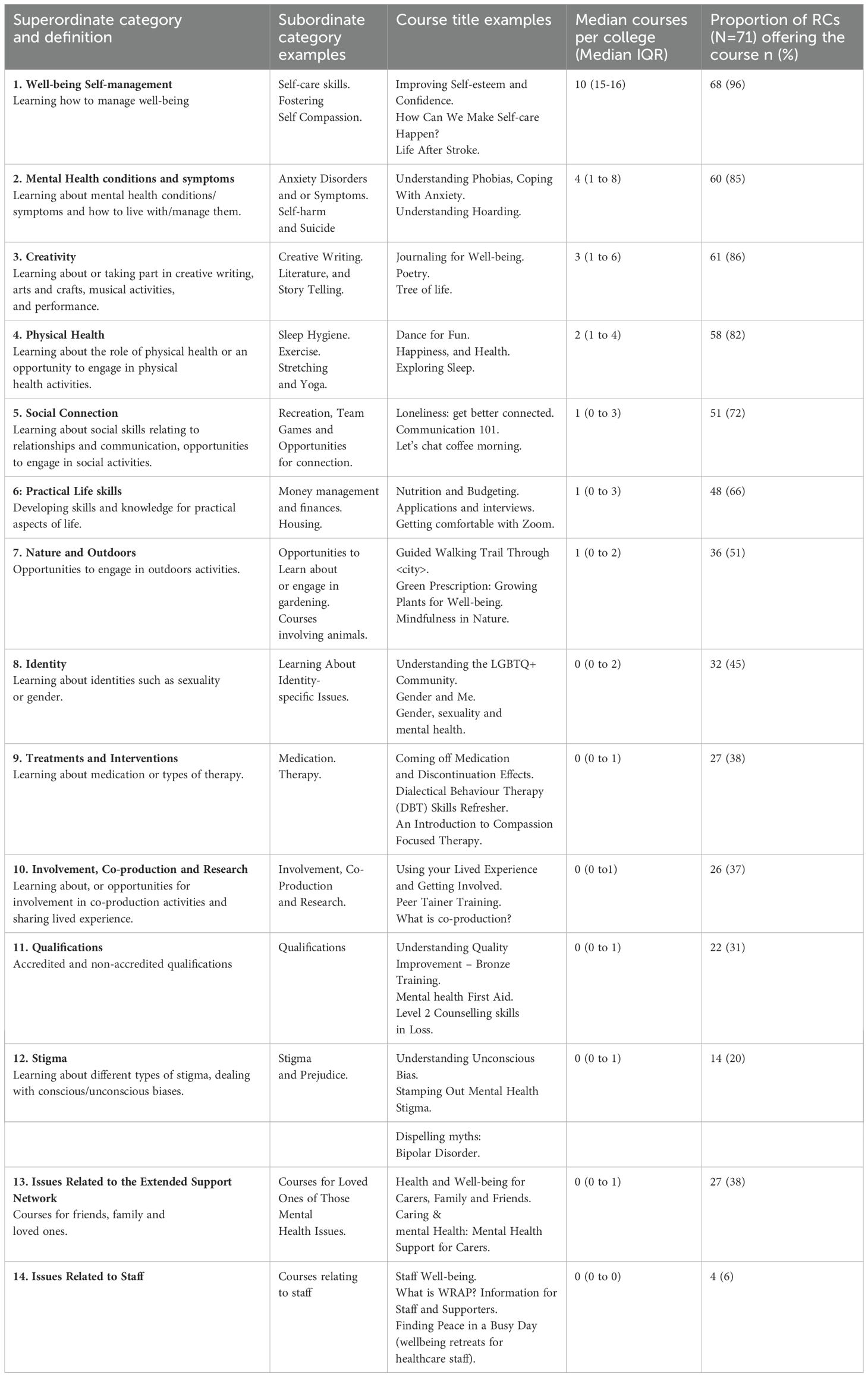A Correction on
The content of Recovery College courses in England: a 71 college document analysis
by Takhi SK, Brown HH, Ronaldson A, Lawrence V, McPhilbin M, Ingall BR, Daryanani R, Simpson J, Jebara T, Lawrence S, Kapka A, Kotera Y, Dunnett D, Hayes D, Stepanian K, Yeo CF, Meddings S, Rennison J, Barrett K, Rowles JG, Miyamoto Y, Kroon H, Henderson C and Slade M (2025). Front. Psychiatry 16:1605498. doi: 10.3389/fpsyt.2025.1605498
Reference 15 was incorrectly cited in place of reference 20. The correct citation has now been inserted in the section 2 Materials and methods, 2.3 Data collection and analysis, Paragraph 1 and should read:
“The READ method of document analysis was followed (20).”
A sentence was repeated. A correction has been made to the section 2 Materials and methods, 2.3 Data collection and analysis, Paragraph 2:
“Following the pilot round of using the typology deductively on the one hundred course titles, discussions were held between analysts to highlight discrepancies in coding, refine the framework and maximize rater concordance.”
Reference 24 was cited in the wrong sentence and should have been cited in place of reference 25. A correction has been made to 4 Discussion, Paragraph 1:
“Courses such as Improving Self-esteem and Confidence and Understanding Phobias may target cognitive and affective change, whereas courses such as Life After Stroke, Nutrition and Budgeting, and Green Prescription: Growing Plants for Well-being could target more behavioral and functional change. RCs have evidenced cognitive changes where students no longer identify themselves as merely unwell individuals and instead, have transitioned to viewing themselves as responsible for their own recovery (24).”
The number of key mechanisms of change was incorrectly given as four. A correction has been made to the section 4 Discussion, Paragraph 3:
“Furthermore, a study of RC students identified five key mechanisms of change.”
There was a mistake in Table 1 as published. Some course title examples were omitted. The corrected Table 1 appears below.
There was a formatting error in reference 11. It should be:
“Thornhill H, Dutta A. Are recovery colleges socially acceptable? BJPsych Int. (2016) 13:6–7. doi: 10.1192/s2056474000000878”.
The original version of this article has been updated.
Keywords: Recovery college, document analysis, fidelity measure, course content, inductive content analysis
Citation: Frontiers Production Office (2025) Correction: The content of Recovery College courses in England: a 71 college document analysis. Front. Psychiatry 16:1652479. doi: 10.3389/fpsyt.2025.1652479
Received: 23 June 2025; Accepted: 23 June 2025;
Published: 08 July 2025.
Approved by:
Frontiers Editorial Office, Frontiers Media SA, SwitzerlandCopyright © 2025 Frontiers Production Office. This is an open-access article distributed under the terms of the Creative Commons Attribution License (CC BY). The use, distribution or reproduction in other forums is permitted, provided the original author(s) and the copyright owner(s) are credited and that the original publication in this journal is cited, in accordance with accepted academic practice. No use, distribution or reproduction is permitted which does not comply with these terms.
*Correspondence: Frontiers Production Office, cHJvZHVjdGlvbi5vZmZpY2VAZnJvbnRpZXJzaW4ub3Jn
 Frontiers Production Office*
Frontiers Production Office*